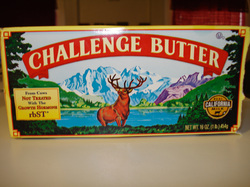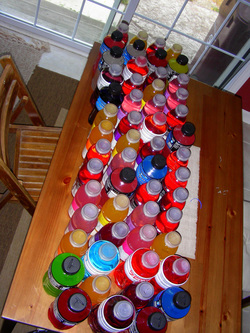So check out these 10 banned foods, so you will know what to avoid next time you're shopping. And remember, eat fresh, whole foods, eat local, eat organic, avoid processed foods, and you'll miss all the nastiness without even thinking about it!

The use of rBGH is banned in Australia, Canada, New Zealand, Israel, and the European Union, and there is an international ban on the importation of American milk in at least 30 countries.
How to Avoid It:
Purchase only organic dairy products, or those labeled "rBGH-free."
Banned Food #2: Genetically Engineered Foods (GMOs)
While GMO's are currently considered by the FDA as "GRAS" (Generally Recognized As Safe), we are still in the experimental phases of this massive trial. Genetically modified foods have really only become mainstream in the past 10 years. Unfortunately, this is not nearly long enough to determine the true long-term effects that consumption of GMOs may have on humans.
Most animals, however, have shorter lifespans, and the results we've seen so far are not so good.... A number of recent studies show that animals fed on genetically engineered foods such as corn and soybeans suffer a wide range of alarming health problems, from organ damage, cancer and tumors, to birth defects, and even sterility by the third generation.
Obviously we have not yet gotten to the third generation of humans fed on GMO foods, so we don't know for certain that they will affect humans the same way, but do you really want to be a guinea pig??
GMO foods are currently banned in the European Union, and other countries are sure to follow suit soon.
How to Avoid It:
Buy organic. (Organic standards currently prohibit the use of GMOs - although there are some in the industry who are lobbying for their allowance - keep an eye out for opportunities to voice your opinion on this, and keep organics GMO-free!) Or look for foods that are typically not genetically engineered (yet). Corn, soy, and papaya, among others, are now almost always genetically modified.
Banned Food #3: Ractopamine-Tainted Meat
Ractopamine is a drug originally designed as an asthma medication, which is often administered to meat animals to make them gain muscle. The most commonly tainted meats include pork, beef, and turkey. Side effects in the treated animals include reduced reproductive function, increased incidence of infection, and premature death, among others. Among humans, ractopamine can impact the cardiovascular system, and "may cause chromosomal abnormalities and behavioral changes."*
Currently the use of ractopamine in livestock is banned in 160 different countries across Europe, Russia, and China, and Russia banned the import of American meat in 2013 - until the US can certify that it no longer uses this drug on meat animals - but the US currently does not even test for this substance in meats.
How to Avoid It:
Since the FDA does not require that meats be tested for ractopamine, the only way you can really be sure you're not eating it is to buy organic meat. As I have mentioned numerous times before, if you're a meat-eater, organic, grass-fed meat is the ONLY way to go!

BVO was originally created as a flame retardant (yum!), but is now a common additive to sports drinks and some sodas - particularly the citrus-flavored kind. BVO has been shown to accumulate in human tissue and breast milk, and is an endocrine disrupter, as well as other not-so-nice things. In toxic doses, BVO can cause acne and other skin rashes, loss of appetite, fatigue, and cardiac arrhythmia.
It is banned as a food additive in Europe and Japan, and the US may be waking up to its dangers, as its classification has recently changed from "GRAS," to an "interim" food additive, meaning they are questioning its long-term safety for consumption.
How to Avoid It:
Don't drink soda! Period. Switch to water, and your health will benefit in more ways than one! However, if you absolutely must, choose all-natural sodas which are naturally flavored, sweetened, and colored.
Banned Food #5: Processed Foods Containing Artificial Colors
American processed foods contain over 3,000 food additives such as flavorings, dyes, and preservatives, and they are often promoted to children, where they may have the most deleterious effects. Some research shows that many of these additives such as Red 40, Yellow 5, Blue 6, Blue 2, etc., - often found in common children's foods such as macaroni & cheese, Jello, cereals, and more - may be toxic to children, and cause behavioral problems, allergies, and other hazardous effects on health. In lab animals, consumption of these additives has shown symptoms such as cancer, birth defects, and more.
Artificial colors in foods are currently banned in Norway and Austria, plus Great Britain, and the European Union requires a warning notice on foods that contain dyes. (The use of natural colorings instead, sourced from vegetables like beets and paprika, is encouraged.)
How to Avoid It:
Don't eat processed foods. They contain a lot more that is hazardous to your health than just dyes! In fact, I would venture to say that if all you do is cut processed foods out of your diet, you will see vast improvements in your overall health. Not only are they expensive, but they contain virtually no nutrients that your body needs, and lots of junk that it doesn't! Switch to real, whole, natural foods, and see how much better you feel. If not for you, do it for your kids - it's one of the best things you can do - other than quitting smoking - to stick around longer for them.
And be sure to check back next week for the next 5 banned foods on the list - and how you can avoid them to live a longer, healthier life!
* You can find other information on these foods in various places, but most of the stats and facts in this post are sourced from this article on www.eatlocalgrown.com.



 RSS Feed
RSS Feed